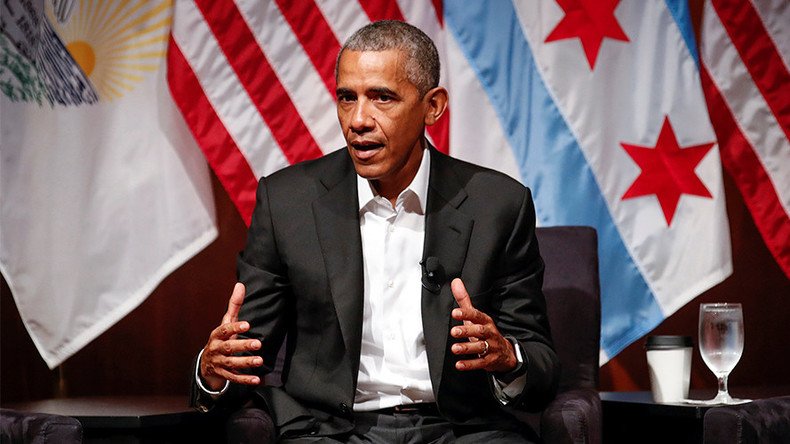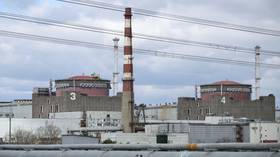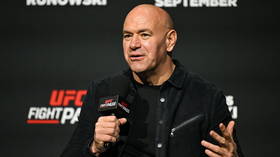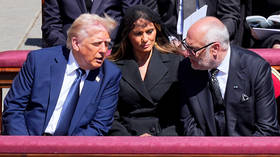Obama secures $800,000 for two speaking engagements

Former President Barack Obama has secured another $400,000 fee as he was interviewed for 90 minutes by cable network A&E Networks before an audience of advertisers. It is second speaking engagement for $400K announced in the same week.
At the event at the Pierre Hotel in New York on Thursday, Obama got a standing ovation when he entered the room. Asked about what he missed most about the White House, he said it was sitting on the Truman Balcony on summer nights and gazing at the Washington Monument and the Lincoln Memorial, a source in attendance said, according to the New York Post.
Barack Obama has now been paid $800,000 for two speeches https://t.co/YrVAhgMHw5
— The Independent (@Independent) April 28, 2017
The A&E appearance comes just days after it was revealed by Fox Business News on Monday that Obama would receive another $400,000 for appearing at a healthcare conference organized by Wall Street investors Cantor Fitzgerald in September.
Criticism from leading Democrats has been swift.
Sen. Warren said she is "troubled" to hear Obama will receive $400,000 to speak at a Wall Street health conference https://t.co/pzJdlKYE3vpic.twitter.com/L61scnABAu
— CNN (@CNN) April 27, 2017
US Senator Elizabeth Warren (D, Massachusetts) said she was troubled, and concerned about the overall influence of money in politics.
"I was troubled by that," the Massachusetts senator said Thursday during an interview with the SiriusXM show "Alter Family Politics" on Radio Andy, according to ABC News.
“People understand the money that goes into campaign contributions… The money that goes into hiring lobbyists, but it's also the money that goes into bought-and-paid-for experts, the money that goes into think tanks that have these shadowy funders."
Bernie Sanders criticizes Obama's "unfortunate" choice to take $400,000 for a Wall Street speaking fee https://t.co/DYq6gIvG13pic.twitter.com/bzfpSKzGWL
— The Hill (@thehill) April 28, 2017
Former presidential candidate Senator Bernie Sanders (I-Vermont) called it "unfortunate" that the Democratic leader would ally himself with Wall Street interests.
"I think at a time when people are so frustrated with the power of Wall Street and the big money interests, I think it is unfortunate that President Obama is doing this," Sanders said on CBS's "This Morning."
"Wall Street has incredible power, and I would have hoped that the president would not have given a speech like this," he added.
Obama spokesman Eric Schultz says in a statement that the Democratic former president accepted the Cantor Fitzgerald invitation to speak because health care is "an issue of great importance to him," according to AP.
He added that Obama implemented financial reforms even after taking money from Wall Street as a candidate in 2008.
Twice the price of #Clinton: Former Pres. #Obama to get $400K for #WallStreet speech https://t.co/T9UgOfsL7xpic.twitter.com/kQU4RzNLfH
— RT America (@RT_America) April 25, 2017
There has been criticism about Obama cashing in on his presidency but the Intercept shed light on the controversial Wall Street investor that is due to host Obama in September.
Cantor Fitzgerald was the major Wall Street brokerage house that lost 658 of its 960 employees when the World Trade Center was destroyed in the September 11, 2001 terrorist attacks.
The company was successful in reaching a settlement in 2013 for $135 million after suing American Airlines for damages.
Cantor had originally demanded more than $1 billion in damages claiming American Airlines was negligent in allowing five terrorists to board the plane in Boston that crashed into the World Trade Center’s north tower, where Cantor had its offices.
The Intercept reported Cantor’s chairman Howard Lutnick and his Cantor partners kept some of the money for the firm and distributed the rest to themselves in proportion to their ownership stake, with Lutnick receiving $25 million.
The firm sued for loss of property, like furniture and artwork, and for the interruption of its business, derived from its “exceptionally talented and liberally compensated” brokers, as one Cantor expert put it, whose “deaths severely impacted the dominance enjoyed by the firm.”
After the proceeding, Lutnick, said in a statement: “For us, there is no way to describe this compromise with inapt words like ordinary, fair or reasonable. All we can say is that the legal formality of this matter is over.”
None of the money went to any of the surviving families. Over half of the 658 Cantor employees killed had families, three dozen wives were pregnant, and 20 families lost two people in the attack.
Two of the widows told the Intercept they were never informed of the settlement, nor that the company had filed a lawsuit in the first place.
The New York Times reported, however, that American Airlines argued that Cantor could not legally seek such damages arising from the deaths of its employees.
“As tragic as those deaths were,” the airline wrote, “Cantor simply cannot recover such damages.”
Judge Alvin K. Hellerstein of Federal District Court in Manhattan ultimately agreed, finding that New York law does not allow an employer to sue for the wrongful deaths of its employees. Such suits may be brought only by the heirs or estates.
Many of the families obtained compensations from the $7 billion special fund Congress created for 9/11 survivors and victims’ families. The average payout was $1.8 million.
Many families complained though that the payouts didn’t reflect the high potential earners of their deceased family members.












